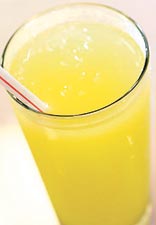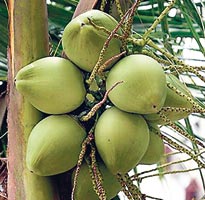Gastroenteritis is an infection of the gut (stomach and intestines) that can cause diarrhoea, vomiting and tummy ache. Diarrhoea is a condition where the patient passes watery stools more than the usual number of times for a day. In most patients the infection clears within a few days, but it sometimes takes longer.
 |
| Lime juice |
The main risk of gastroenteritis is dehydration. When there is blood and mucus in diarrhoea, it is a more serious condition and is dealt with separately as dysentery.
A large number of organisms can cause diarrhoea. Rota virus is the commonest cause in Sri Lanka. Bacteria like e.coli, salmonella, protozoas like entamoeba and whip worms can also give rise to diarrhoea.
Organisms can enter the body through the mouth when you eat contaminated food or drink unclean water. It can also be spread through insects like flies and by contaminated hands. These organisms and their toxins damage the lining of the gut. This will allow a large amount of water and salts to be lost with stools leading to dehydration.
Symptoms and signs:
Symptoms of gastroenteritis include diarrhoea, vomiting and abdominal pain. Sometimes fever may develop.
Signs of dehydration :
- Thirst
- Reduction of urine output
- Dry tongue
- Tears absent when crying
- In infants a depression is formed in the soft area on top of the skull (anterior fontanelle)
- Loss of elasticity of skin – when the skin is pinched usually it goes back rapidly but when there is dehydration it goes back slowly
When there is severe dehydration the patient becomes restless or weak. Breathing become rapid and hands and feet get cold and clammy. The patient can become drowsy or even lapse into a semi-conscious state. The patient should be taken to the nearest hospital if dehydration is getting worse.
Complications -Dehydration, malnutrition or even death
Management - Water and electrolytes lost during diarrhoea should be replaced.
In the case of infants, continue breast feeding and feeding with easily digestible nutritious food to maintain nutritional status. Give your child rice kanji, pori kanji, yoghurt, anamalu bananas in addition to usual meals. If giving infant formula, it should be made to half strength.
Give the child lots of fluids like king coconut water, young coconut water (kurumba), lime juice and soup. Sweetened artificial fruit drinks can make diarrhoea worse.
 |
| Young coconut |
Encourage the child to eat much as he wants. Mothers may withhold food thinking that this may stop the diarrhoea. But it is very important to feed the child to prevent malnutrition. Small frequent feedings are the best.
Avoid bulky, high fibre and fatty foods which are hard to digest. After diarrhoea has stopped continue to give the child one extra meal daily for about two weeks to avoid malnutrition.
Giving ‘Jeewani’ (oral rehydration solution) helps to replace the salt and water loss.
Investigations are not usually needed. But sometimes a medical practitioner may request a stool full report and a stool culture for management purposes.
Do not give anti diarrhoeals or antibiotics unnecessarily.
Preventive measures
- Wash hands with soap and water especially before preparing food, eating and after using the toilet. Drink boiled, cooled water.
- Protect cooked food from flies and cockroaches.
- Wash raw fruits, vegetables and leaves before consumption.
- Use of latrines and proper disposal of stools of young children.
Immunization –The measles vaccination can prevent diarrhoea following measles.
- A new vaccine called Rotrix is available in the private sector. This can prevent diarrhoea due to rota virus.
(The writer is attached to the Health Education Bureau) |



